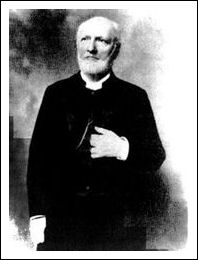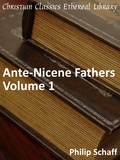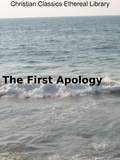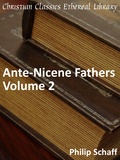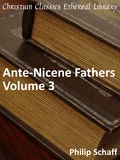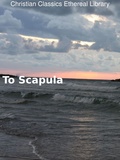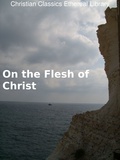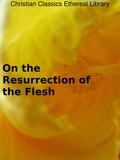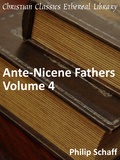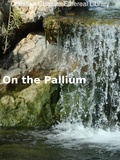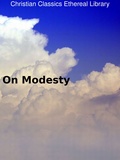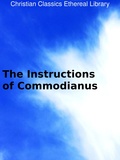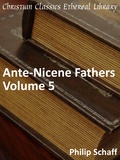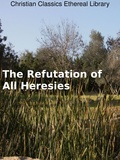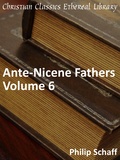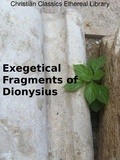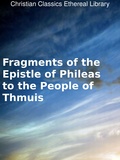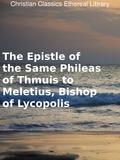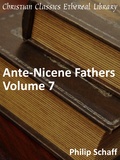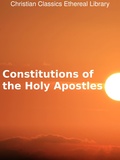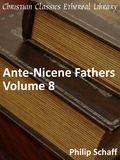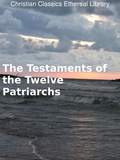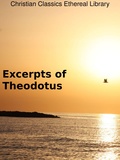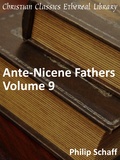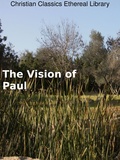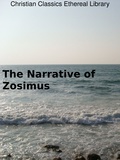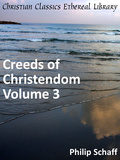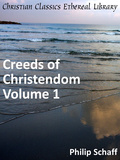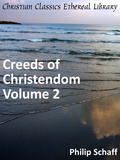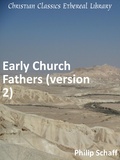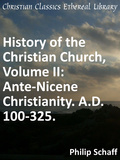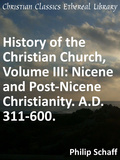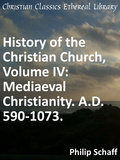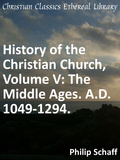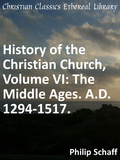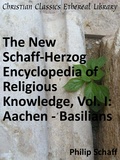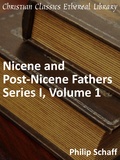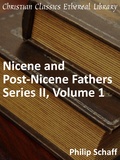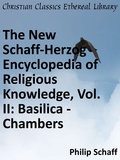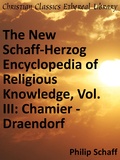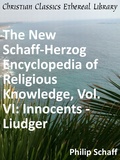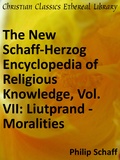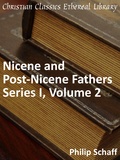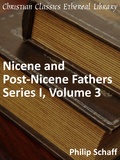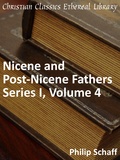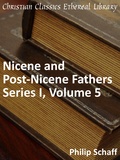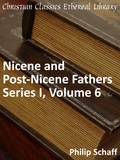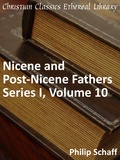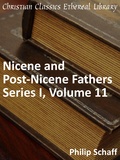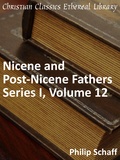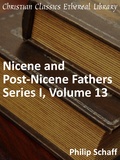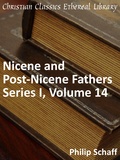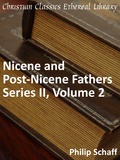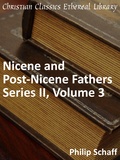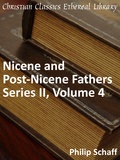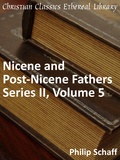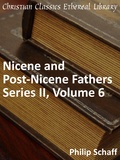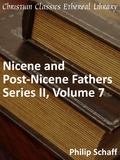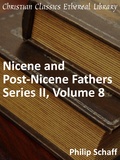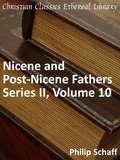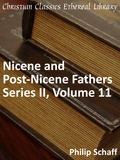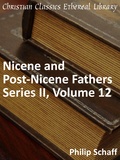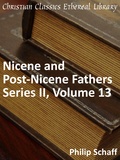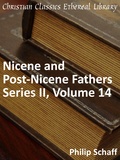Philip Schaff
German-American theologian and church historian
Biography
Schaff was born in Chur, Switzerland and was educated at the gymnasium of Stuttgartt, and at the universities of Tubingen, Halle and Berlin, where he was successively influenced by Baur and Schmid, by Tholiuck and Julius Muller and, above all, Neander. In 1842 he was Privatdozent in the University of Berlin, and in 1843 he was called to become professor of church history and Biblical literature in the German Reformed Theological Seminary of Mercersburg, Pennsylvania, then the only seminary of that church in America.
On his journey he stayed in England and met Edward Pusey and other Tractarians. His inaugural address on The Principle of Protestantism, delivered in German at Reading Pennsylvania, in 1844, and published in German with an English version was a pioneer work in English in the field of symbolics (that is, the authoritative ecclesiastical formulations of religious doctrines in creeds or confessions). This address and the "Mercersburg Theology" which he taught seemed too pro-Catholic to some, and he was charged with heresy. But, at the synod at York, in 1845, he was unanimously acquitted.
In consequence of the ravages of the American Civil War the theological seminary at Mercersburg was closed for a while and so in 1863 Dr. Schaff became secretary of the Sabbath Committee in New York City, and held the position till 1870. He became a professor at Union Theological Seminary, New York City in 1870 holding first the chair of theological encyclopedia and Christian symbolism till 1873, of Hebrew and the cognate languages till 1874, of sacred literature till 1887, and finally of church history, till his death.
His History of the Christian Church resembled Neander's work, though less biographical, and was pictorial rather than philosophical. He also wrote biographies, catechisms and hymnals for children, manuals of religious verse, lectures and essays on Dante, etc.
Quotes by Philip Schaff
Quotations
- Our first parents fell into open disobedience because already they were secretly corrupted; for the evil act had never been done had not an evil will preceded it. And what is the origin of our evil will but pride? (NPNF1-02. St. Augustine's City of God and Christian Doctrine)
- By craving to be more, man becomes less; and by aspiring to be self-sufficing, he fell away from Him who truly suffices him. (NPNF1-02. St. Augustine's City of God and Christian Doctrine)
- How hast Thou loved us, O good Father, who sparedst not Thine only Son, but deliveredst Him up for us wicked ones! (NPNF1-01. The Confessions and Letters of St. Augustine, with a Sketch of his Life and Work)
- whosoever should believe and should repent, and turn from his sins, should be saved by the same faith and repentance on the ground of which he is received into the bosom of the Church (NPNF1-02. St. Augustine's City of God and Christian Doctrine)
- Furthermore, as there is a kind of death of the soul, which consists in the putting away of former habits and former ways of life, and which comes through repentance (NPNF1-02. St. Augustine's City of God and Christian Doctrine)
- there is a kind of death of the soul, which consists in the putting away of former habits and former ways of life, and which comes through repentance (NPNF1-02. St. Augustine's City of God and Christian Doctrine)
- And just as the soul, after it has put away and destroyed by repentance its former habits, is created anew after a better pattern, so we must hope and believe that the body, after that death which we all owe as a debt contracted through sin, shall at the resurrection be changed into a better form;—not that flesh and blood shall inherit the kingdom of God (for that is impossible), but that this corruptible shall put on incorruption, and this mortal shall put on immortality (NPNF1-02. St. Augustine's City of God and Christian Doctrine)
- And thus the body, being the source of no uneasiness because it can feel no want, shall be animated by a spirit perfectly pure and happy, and shall enjoy unbroken peace. (NPNF1-02. St. Augustine's City of God and Christian Doctrine)
- Now he whose soul does not die to this world and begin here to be conformed to the truth, falls when the body dies into a more terrible death, and shall revive, not to change his earthly for a heavenly habitation, but to endure the penalty of his sin (NPNF1-02. St. Augustine's City of God and Christian Doctrine)
- When we are on the way, and that not a way that lies through space, but through a change of affections, and one which the guilt of our past sins like a hedge of thorns barred against us, what could He do [...] except to forgive us all our sins? (NPNF1-02. St. Augustine's City of God and Christian Doctrine)
- We must beware of taking a figurative expression literally. For the saying of the apostle applies in this case too: “The letter killeth, but the spirit giveth life. (NPNF1-02. St. Augustine's City of God and Christian Doctrine)
- We must beware of taking a figurative expression literally. For the saying of the apostle applies in this case too: “The letter killeth, but the spirit giveth life. (NPNF1-02. St. Augustine's City of God and Christian Doctrine)
- For the Church is His body [...] He exercises it in the present time, and purges it with many wholesome afflictions. (NPNF1-02. St. Augustine's City of God and Christian Doctrine)
- The body, after that death which we all owe as a debt contracted through sin, shall at the resurrection be changed into a better form;—not that flesh and blood shall inherit the kingdom of God... but that this corruptible shall put on incorruption (NPNF1-02. St. Augustine's City of God and Christian Doctrine)
- The belief of the resurrection of our Lord from the dead, and of His ascension into heaven, has strengthened our faith by adding a great buttress of hope (NPNF1-02. St. Augustine's City of God and Christian Doctrine)
- He who hath the Spirit not only is called Christ’s, but even hath Christ Himself. For it cannot but be that where the Spirit is, there Christ is also. For wheresoever one Person of the Trinity is, there the whole Trinity is present. For It is undivided in Itself, and hath a most entire Oneness (NPNF1-11. Saint Chrysostom: Homilies on the Acts of the Apostles and the Epistle to the Romans)
- The belief of the resurrection of our Lord from the dead, and of His ascension into heaven, has strengthened our faith by adding a great buttress of hope. (NPNF1-02. St. Augustine's City of God and Christian Doctrine)
- The belief of the resurrection of our Lord from the dead, and of His ascension into heaven, has strengthened our faith by adding a great buttress of hope. For it clearly shows how freely He laid down His life for us when He had it in His power thus to take it up again. (NPNF1-02. St. Augustine's City of God and Christian Doctrine)
- There are certain rules for the interpretation of Scripture which I think might with great advantage be taught to earnest students of the word (NPNF1-02. St. Augustine's City of God and Christian Doctrine)
- For if he takes up rashly a meaning which the author whom he is reading did not intend, he often falls in with other statements which he cannot harmonize with this meaning. And if he admits that these statements are true and certain, then it follows that the meaning he had put upon the former passage cannot be the true one: and so it comes to pass, one can hardly tell how, that, out of love for his own opinion, he begins to feel more angry with Scripture than he is with himself. (NPNF1-02. St. Augustine's City of God and Christian Doctrine)
- The Trinity the True Object of Enjoyment (NPNF1-02. St. Augustine's City of God and Christian Doctrine)
- The Trinity the True Object of Enjoyment (NPNF1-02. St. Augustine's City of God and Christian Doctrine)
- The man who does not strive about words, whether he speak quietly, temperately, or vehemently, uses words with no other purpose than to make the truth plain, pleasing, and effective (NPNF1-02. St. Augustine's City of God and Christian Doctrine)
- The man who does not strive about words, whether he speak quietly, temperately, or vehemently, uses words with no other purpose than to make the truth plain, pleasing, and effective (NPNF1-02. St. Augustine's City of God and Christian Doctrine)
- We must hope and believe that the body, after that death which we all owe as a debt contracted through sin, shall at the resurrection be changed into a better form;—not that flesh and blood shall inherit the kingdom of God (for that is impossible), but that this corruptible shall put on incorruption, and this mortal shall put on immortality (NPNF1-02. St. Augustine's City of God and Christian Doctrine)
- We must watch lest hatred of any one gain a hold upon the heart, and so not only hinder us from praying to God with the door of our chamber closed, but also shut the door against God Himself; for hatred of another insidiously creeps upon us, while no one who is angry considers his anger to be unjust (NPNF1-01. The Confessions and Letters of St. Augustine, with a Sketch of his Life and Work)
- We must watch lest hatred of any one gain a hold upon the heart, and so not only hinder us from praying to God with the door of our chamber closed, but also shut the door against God Himself; for hatred of another insidiously creeps upon us, while no one who is angry considers his anger to be unjust (NPNF1-01. The Confessions and Letters of St. Augustine, with a Sketch of his Life and Work)
- Anger habitually cherished against any one becomes hatred, since the sweetness which is mingled with what appears to be righteous anger makes us detain it longer than we ought in the vessel, until the whole is soured, and the vessel itself is spoiled (NPNF1-01. The Confessions and Letters of St. Augustine, with a Sketch of his Life and Work)
- To see God, the soul must be purified (NPNF1-02. St. Augustine's City of God and Christian Doctrine)
